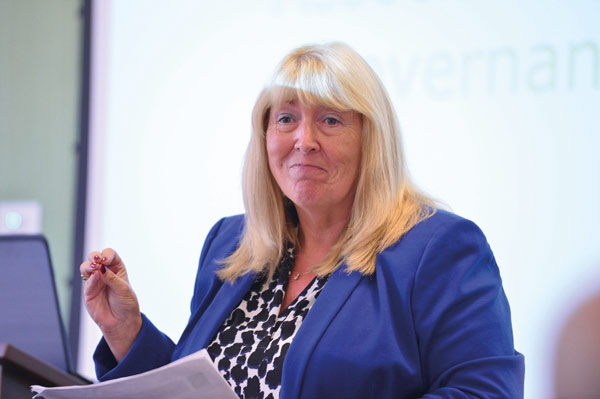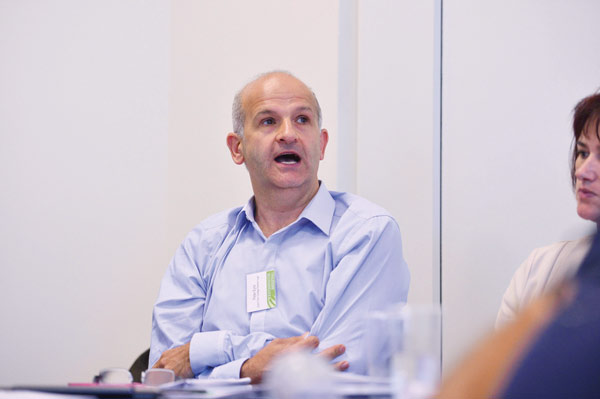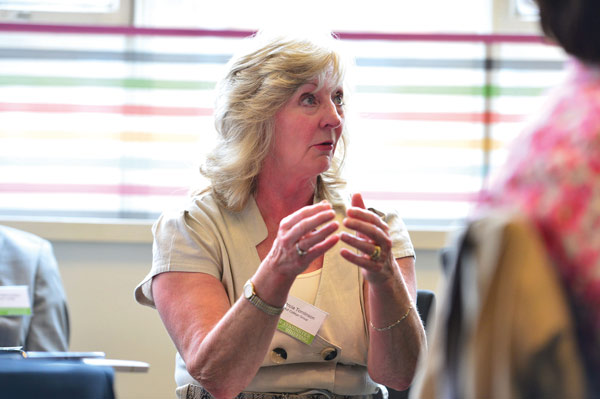Governors should “be a bit braver” when challenging colleges on teaching and learning, according to former Department for Business, Innovation and Skills chief Dr Sue Pember.
The ex-head of FE and skills investment and performance at BIS, who is now a governance adviser at the Association of Colleges (AoC), said governors should trust their instincts when observing lessons.

Dr Pember, addressing governors and principals at a seminar organised by Westminster Briefing and the 157 Group on Wednesday (September 17), said: “You as individuals, you have all been through the school system. I would trust your instinct. If it’s boring to you and you’ve just been in 10 of them [lessons] that look really boring, trust your instincts and think, would you sign up to that course? Be a bit braver about this.”
She added: “Staff and student governors come into their own with you when they’re talking about the curriculum, because they’re the ones that can signpost you through — you know, level two, level three, BTec national, HNC — they know this, they are living and breathing it.
“They will know the curriculum changes that are coming through, and I still don’t think we use enough of staff and student governors around the governing body table to help explain.
“It’s normally the senior leaders who feel they have to talk about some of these things, but other people can talk about them as well. So how can you, as individuals, use your skills? Well, first of all, you should be assured that you’ve got systems that are assessing the teaching and learning in the college.”
With the focus of the conference ‘college governor leadership: involvement on learning teaching and assessment,’ Dr Pember also spoke about the need for governors to be assertive and not get too “cosy” with college leadership.

“Yes, you have to be assertive,” she said, “but not assertive with the finger out, but assertive in the form that you’re clear and you communicate and you ask good, challenging questions.
“There is a set of behaviours in the way a governing body acts. There shouldn’t be a clique where they go away, you know, the chair, the clerk and the principal, and then they come back and say, ‘We met last week in the pub and I’ve sorted it’. That really drives me crazy, and I hate when the principal says, ‘oh, we’ve just had a pre-meeting’.”
The seminar also heard from BIS deputy director for standards and qualifications Bobbie McClelland, who said governors needed to be well-informed about policy to do the job well, and could rely on regular updates from government.
She said: “High-performing governing bodies need to be clear on their roles, setting their direction and being outwardly accountable.
“To do that, you need to understand the wider policy context and government expectations, and we have done a number of things in this area which I hope you’ll see are helping you.

“The last couple of years, the minister has written out, on a termly basis, to governors, directly, about the important things that government is thinking about. And if you’re not getting those letters, you need to be asking your clerk where they are, because they are there for you.
“They are letters which attach a whole set of briefing about latest government thinking on the important issues — and of course they featured very strongly most recently the English and maths story, the workforce measures that the government is actually putting in place to support the sector to actually improve the quality of teaching and learning in English and maths.
“I hope you are aware of those measures, because there’s more than £30m being thrown in over two years to actually enable you to recruit graduates, to enhance the skills of your existing staff — so there’s a lot going on in that front.”
Senior Ofsted inspector Julie Ashton also addressed the seminar, focusing on the importance of the role of governors in ensuring
English and maths provision is of a high enough quality.

Ms Ashton said: “When I was a newly-qualified teacher back in 1992, English and maths was important then. I have taught in schools, I have taught in sixth form colleges and general FE colleges, and it’s never gone away. So what really saddens me is that it’s 2014 and it’s still a priority and we still for whatever reason haven’t got it right.
“The responsibility for delivering English and maths is everybody’s responsibility, not just the English and maths specialists, it has to be much broader than that.
“To me it’s that accountability of the senior leadership team which matters most. Governors and senior leaders comparing perhaps success rates which perhaps include and exclude Functional Skills so you can
spot the differences and then challenge them.”
Olivia Dorricott, director of leadership, governance and management
at the Education and Training Foundation (ETF), spoke about the help and support the ETF offered governors, but also shared her personal experience as someone new to a governing board having recently started the role at Waltham Forest College.
She said: “I also am here I suppose in a personal capacity. I have just become a governor, and so I am living a new induction.

“I am having some pretty significant and serious conversations with the senior leadership team about what they expect from me, and I was just saying, in my inductions with them, I have asked them what they expect from me as a governor, and that question, asked in five different places, has been very revealing.
“They want me to arrive at meetings having read the papers, they want me to ask questions and they want me to be present, and aware of the college and in particular the students.
“My initial pushback was on technology. If as a working mother-of-two with two volunteer roles you want me to read the papers, then put them in a format I can find time to read, and that doesn’t mean a deck of papers, it means technology, technology, technology.”










I’m sorry, but the whole concept of Governors being engaged in class room activity and lesson observation is completely ludicrous.
We must stop looking at Governors as though they are operational resources and remember their purpose as strategic leaders. Governors set the direction of travel, monitor performance and intervene where necessary. They do not need to carry out lesson observations to do this…..I mean, should they also process invoices, or enrol learners?
Governor development should be focussed on how to manage and monitor the performance of a College. Getting this right would allow Governors to challenge performance in the right way, using their precious time to good effect and recognising the fact that many of these people are volunteers with other commitments.